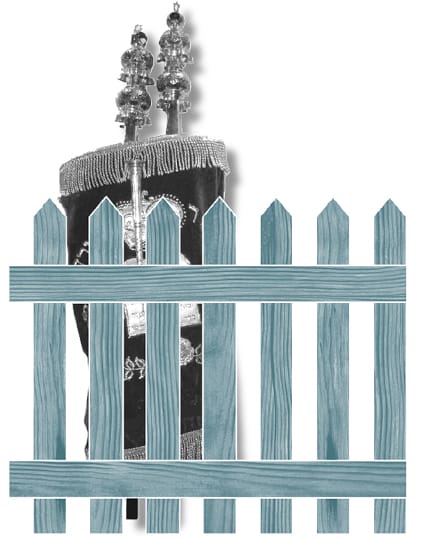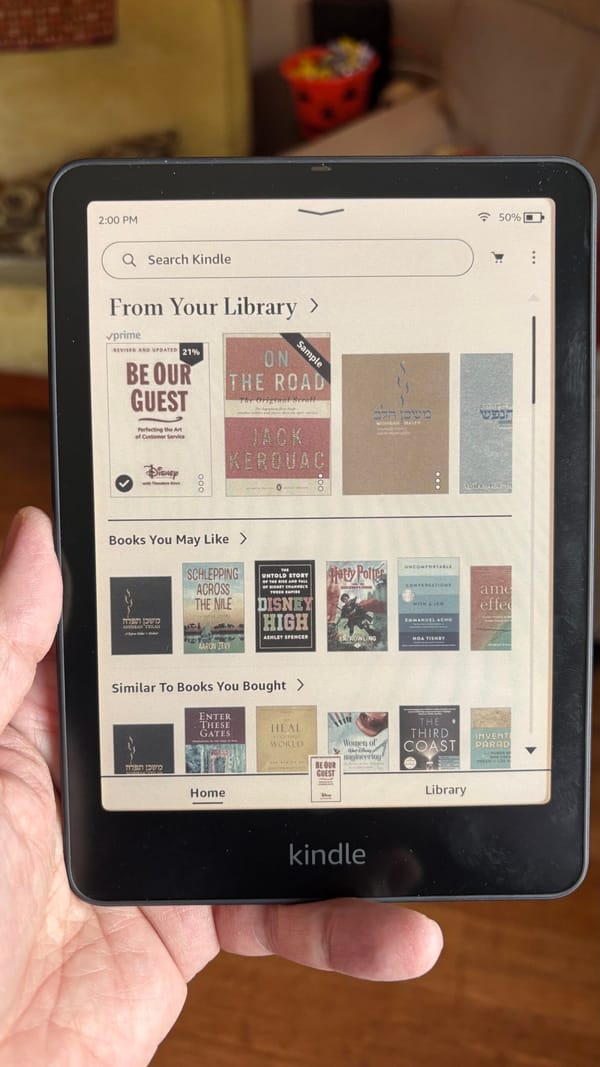In Which I Discover My Fences
Jews-by-Birth often inspire Jews-by-Choice to think in wider, more universal terms about our Judaism. In return, we hope to inspire Jews-by-Birth not to forget the particularities that make us--and keep us--Jewish.

The most maddening sentence I ever hear as a Jew-by-Choice often comes from within my movement-of-choice: "We're Reform, we don't have to do that." Or some version of said sentence, anyway: We don't have to follow that; we don't have to obey mitzvot; we don't have to treat Judaism as if it's written in stone. (Oy.)
The sentence is maddening for two reasons: many Reform Jews believe this to be true; and, in fact, it isn't. As adult Jews, we're given the right in Reform Judaism to make personal decisions about our relationship with Jewish law. But nowhere does the movement tell us that we can simply ignore whatever we want in Jewish law or liturgy and that's ok.
While we aren't Orthodox in our Judaism, we still have certain fences around the Torah. If we didn't, we would be exactly what non-liberal Jews accuse us of being: pick-and-choose Jews. But how often do such denominational standards get discussed at the congregational level? In Reform, congregations have the authority to determine their own standards of worship and observance. But where do we--or should we--define the limits of the things that make us and keep us Jewish?
Every few months I encounter a situation at my shul or in some other, personally meaningful Jewish environment that shocks me into agonizing over such questions. There's no point in talking about the latest iteration of this issue here. For dissenting Jews in the minority, I've already learned debates like that are a no-win situation. I suppose that comes with the territory of being a Jew-by-Choice, not to mention one who is called (for want of any better term) to swim in the deeper end of the mitzvot pool. By the Reform movement's own estimation, it is increasingly welcoming of traditional perspectives and styles of observance. My personal experience of that claim is less heartening. In Reform circles, it seems to me it's totally fine for anyone to explore traditional perspectives as long as you keep them to yourself.
It's not a secret anymore that I aspire to rabbinical school. I've spent a lot of time looking into my own many flaws and hopefully equally many strengths trying to figure out the contours of the rabbi I'd like to be (and am capable of being)--religiously, spiritually, emotionally, academically. I've also spent a lot of time trying to look as deeply into my own movement and other liberal streams of Judaism to see how the present and potentially future me might fit into these differing takes on being Jewish, doing Jewish, and being Jewish clergy.
I love the feeling of community and Peoplehood in a Reform congregation. But it drives me up a wall how loosely--and even lightly--we can take Jewish law and liturgy, and as I've blogged before, I'm not a great fan of the words of some contemporary Reform rabbis. I love the idea of a more reliable liturgy in the Conservative movement. But I'm not an enormous fan of being asked to follow the mitzvot just because. (And that words-out-of-the-rabbis'-mouths thing applies here, too.) And the idea of rigorous, text-based study in a traditional environment might make my favorite Orthodox rabbi and Ortho blogger happy, but I doubt I'd fit into Orthodox community in any way other than academically.
That's not to say I intend to change my denominational affiliation, or that any denomination or congregation is or should fulfill the totality of a person's Jewish aspirations. But eventually I will have to make a decision about the direction in which I want to go. Perhaps I'm Conservadox, or as a recent Conservative friends keeps telling me, "No matter what you say on your blog, you have the perspective of a Conservative Jew." Perhaps I just expect too much from other people--other Jews--irrespective of movement.
One thing I do know is it will all work out. That, and with another iteration of my surprise at "textbook Reform Judaism doesn't match up with real-life Reform Judaism," people will be and believe as they will. That's as it should be. If nothing else, I'm coming to learn my own, personal Jewish fences--around the Torah, around the mitzvot, around the liturgy, around the rubrics of the worship service, among other things. A troublesome aspect of what I'm learning is that my fences, which on paper jibe with Reform Judaism's own denominational fences, inadequately match my personal experience of Reform Judaism in actual practice.
It's that way with a lot of things in life, isn't it?
Maybe it's that way in any synagogue. You take what has meaning for you, leave the rest on the table, and stick around as long as what has meaning outweighs what doesn't. On the other hand, maybe this is why our movement has such a difficult time keeping and attracting back younger Jews. We teach them the letter of the law about Reform Judaism, but when they come back as adults, the people who taught them are far less serious about those laws than they asked their children to be. So they come together on their own, form independent minyanim that tend to be a lot more consistent about mitzvot, liturgy, and worship, and turn their backs on the congregations that taught them how to be Jews in the first place.
I don't think that's a strident or unkind contention. I do think it pegs the state of contemporary Reform. If we truly can do whatever we want, why do we bother educating our children Jewishly at all? Or unpacked a different way, why don't we take seriously the things we teach our children to take seriously? And then why are we surprised when they don't want to sit in the next pew with us after college?
That's the danger with being a Jew-by-Choice. Often, the very aspects of Judaism that make our hearts and souls sing are ones that the Jews-by-Birth nearest to us have forgotten or rejected. We're often asked why we care about such things--or criticized for caring. Talk about a difficult relationship.
But it's possible to see it in more positive terms, too. Jews-by-Birth often inspire converts to think in wider, more universal terms about our Judaism, ways that evade the letter of the law but honor the value of Peoplehood.
And we, in turn, hope to inspire born Jews not to forget the particularities that make us--and keep us--Jewish.




